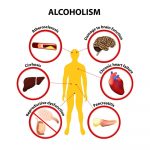- Alcohol-Related Liver Disease
- Fatty Liver Disease
- Alcoholic Hepatitis
- Alcoholic Cirrhosis
- Liver Cancer
- How Does Alcohol Cause Liver Damage?
- How Much Alcohol Causes Liver Damage?
- FAQs
Heavy alcohol use is frequently associated with its damaging effects on the liver including disease, cancer, and cirrhosis.
According to the National Institute On Alcohol Abuse and Alcoholism (NIAAA), alcohol abuse is the most common cause of death related to liver disease in the United States.
Alcohol-related liver disease can occur in three stages: fatty liver disease, alcoholic hepatitis, and cirrhosis of the liver. Alcoholic hepatitis and cirrhosis can be fatal, especially if symptoms do not appear in time.
Alcohol-Related Liver Disease
Long-term, excessive alcohol use increases the risk of severe health problems. In the early stages, liver disease isn’t fatal and the damage can be reversed with abstinence from alcohol. Unfortunately, symptoms usually don’t appear until someone has severe liver damage.
Stages of alcohol-related liver disease include:
Fatty Liver Disease
Fatty liver disease, also known as steatosis, causes a buildup of fat in your liver. It can be caused by alcohol (alcoholic fatty liver disease) or other factors, like obesity. This stage of liver disease is the least severe and the damage is usually reversible.
If you have fatty liver disease, it is important to be protected from all forms of hepatitis, such as hepatitis C, which affects liver function. If you have hepatitis and fatty liver disease, there is a higher risk of experiencing severe symptoms and liver failure.
Alcoholic Hepatitis
In some people, drinking alcohol can lead to alcoholic hepatitis, which is chronic inflammation of the liver. Although it can be reversible, the damage is more severe than fatty liver disease. Inflammation can destroy liver cells and cause scar tissue to develop, known as fibrosis.
Symptoms of alcoholic hepatitis include:
- fever
- jaundice (yellowing of the eyes and skin)
- abdominal pain
- vomiting blood
- fatigue
Alcoholic hepatitis can progress slowly over time, after years of heavy drinking. However, symptoms can also occur abruptly, which increases the risk of liver failure. If you are diagnosed with alcoholic hepatitis, you will need to stop drinking to slow the progression of liver damage.
Alcoholic Cirrhosis
Cirrhosis, which is almost always caused by heavy alcohol use, is the most devastating and fatal stage of liver disease. If alcoholic hepatitis is left untreated, scarring of the liver can progress until it is irreversible.
The scar tissue can impair liver function, which can also interfere with brain and kidney function. Although the effects of cirrhosis can be slowed with abstinence, life-threatening complications can occur.
Symptoms of liver cirrhosis include:
- fatigue
- easily bruised
- weight loss
- itchiness
- jaundice
- confusion
Once you develop cirrhosis, noticeable signs may not occur until there is severe damage and a liver transplant may be necessary. Severe signs of cirrhosis may include ascites (a buildup of fluid in abdomen), high blood pressure, and kidney failure.
If you or a loved one is struggling with alcohol abuse, a medical detox may be vital to stop drinking and reduce the risk of life-threatening liver damage.
Liver Cancer
Alcohol use is also associated with an increased risk of several different types of cancer, including cancer of the mouth, throat, esophagus, breast, pancreas, and colon. In addition, binge drinking is also associated with a higher risk of liver cancer.
How Does Alcohol Cause Liver Damage?
Alcohol is metabolized primarily in the liver, with the help of an enzyme called alcohol dehydrogenase (ADH). ADH converts alcohol into free radicals and acetaldehyde, both of which are toxic to the liver.
Normally, the liver can heal and regenerate damaged cells. However, excessive drinking interferes with the liver’s ability to create healthy cells. After long-term alcohol use, scar tissue builds up and can cause alcoholic hepatitis and cirrhosis of the liver.
How Much Alcohol Causes Liver Damage?
Up to half of all people who drink excessively may develop some form of liver disease. Several factors, including genetics, diet, and overall health can increase the risk of liver damage.
However, the amount of alcohol you drink, which may differ for men and women, plays the biggest role.
Heavy alcohol consumption, which is identified as 5-6 drinks per day for men (and 2-3 drinks daily for women) for several years, significantly increases the risk of liver damage.
The main risk factor for liver disease, which is alcohol abuse, is one you can prevent.
If you or a loved one struggles with alcohol use disorder (AUD), also known as alcohol addiction, Northeast Addictions Treatment Center can help. We offer a wide range of comprehensive services that can help you learn how to maintain long-term recovery.
To learn about our alcohol addiction treatment programs, please reach out to a specialist today.
FAQs
How Does Alcohol Cause Liver Failure?
Excessive alcohol consumption can lead to liver failure. Alcohol can lead to a fatty liver which can turn into alcohol hepatitis and cirrhosis. If those conditions are left untreated and alcohol intake continues, that can cause the liver to fail.
Learn more about Alcohol-Related Liver Failure
Sources
Written by
Northeast Addition Editorial Team
©2024 Northeast Addition Center | All Rights Reserved
This page does not provide medical advice.











